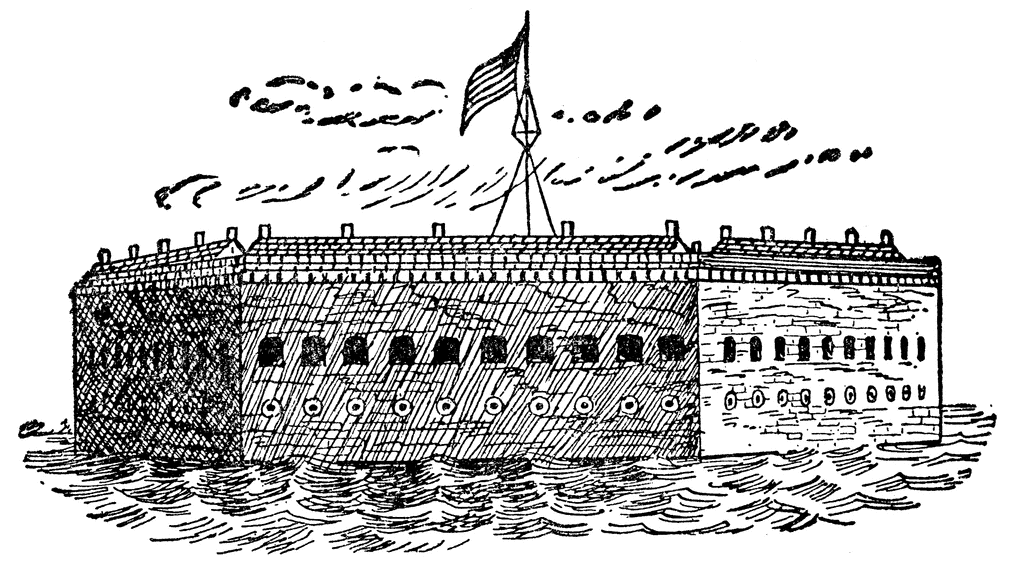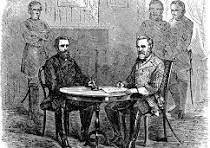- Home
- Social Studies
- Civil War
The Civil War
Called the War of Rebellion in the North and the War Between the States in the South, the Civil War was one of the bloodiest ever fought.
Before the conflict, the United States was a nation undergoing rapid changes:
- in the North, a flood of foreign immigrants as well as rural Americans crowded into newly industrialized and urban areas;
- in the South, an aristocratic, agrarian, and rural tradition held strong;
- this social diversity on the eastern seaboard persisted while at the same time individuals seeking land and wealth drove westward expansion into the harsh, unsettled territories where they could find natural resources, such as gold.
Because of the very different way that the two most populous sections of the country were developing, a growing rivalry naturally resulted, especially with regard to the institution of slavery. Some, primarily in the North wanted to abolish slavery completely, while others, mostly in the South, favored some form of it and wanted it to be allowed in the new territories. Friction also arose between groups who thought the federal government should have control of the territories and groups who believed that each individual state should control its own destiny. Both the North and the South wanted desperately to control the territories to the west – an area almost as large as the entire union of the already established states.

Finally, after antislavery candidate Abraham Lincoln was elected President in 1860, eleven states from the South declared secession from the Union and formed their own Confederate States in February of 1861. After all attempts at compromise failed, war became inevitable when the Confederates attacked Fort Sumter in April of 1861. Thus, the Civil war had begun.
The two sides hastily formed their armies. The brunt of the fighting on battlefields across the United States was carried out by the infantry comprised of foot-soldiers who fought primarily with small arms. The vast majority of the soldiers on both sides of the Civil War were overwhelmingly volunteers who joined and fought for a variety of reasons. A regiment of free Black men fought for the North. At least 400 women disguised as men served as soldiers; a few were doctors and thousands were nurses.
The first battles of the war were won by the Confederacy, although soon victories started going to the North. With the advantage of a larger population and greater industrial development, the North not only had better armaments, but, notably, a network of railroads more than double that of the South. This gave the Union the strategic advantage of being able to move troops and equipment quickly and, perhaps even more important, to move food to the soldiers quickly, a fact that played a large part in its victory.

Finally, on April 9, 1865, after having been surrounded by Union troops, Confederate General Robert E. Lee surrendered to Union General Ulysses S. Grant at Appomattox Courthouse in central Virginia. Lee had little choice – he was cut off from his supplies and his men had not eaten in more than a week. In fact, one of Grant’s first acts of victory was to give 25,000 rations to the Southern troops. Other Confederate forces, learning of Lee’s surrender, followed his example – and the fighting was over.
Two and a half million had fought; a half million had died; many ended up in brutal prisoner-of-war camps. Morphine was available for the first time to ease the pain for the wounded, but there had been so many deaths on both sides that by 1862 the federal government established the first military cemeteries. Most of the fighting had taken place in the South, and its land – the mainstay of the agricultural economy – was devastated. The abolition of slavery also changed the entire nature of the South’s economy – it would take over a decade before the cotton crop regained the level it had before the war.
The Union was victorious, although it, too, had to rebuild. The victory was tempered by sadness over the untimely death of Abraham Lincoln.
Questions ~
- If the conflict over slavery wasn’t the only cause for the Civil War, what were some other causes?
- How many states were in the Union at the beginning of the Civil War?
- Which was the bloodiest battle of the Civil War?
- How were Native Americans affected by or involved in the Civil War?
- What is a sharecropper? Who became sharecroppers?
- Did the Fifteenth Amendment help African American women?
- What was the role of the Freedmen’s Bureau?
- What changes did the Civil War bring about for African Americans?
More …
- Write a paragraph about how to avoid another Civil War in the United States?
- What would be the political, cultural, or economic reasons for a new Civil War?
Después que el candidato antiesclavista Abraham Lincoln fue elegido presidente, once estados del Sur abandonaron la Unión y formaron sus propios Estados Confederados. Cuando todos los intentos de entendimiento fracasaron, la guerra se hizo inevitable.
Okay, so now I've put on some ads from Amazon - from which I may earn a few cents. (2025)



